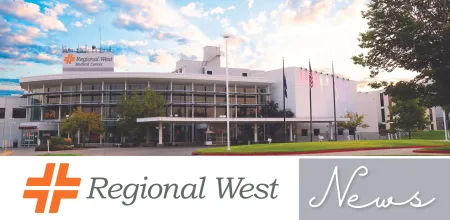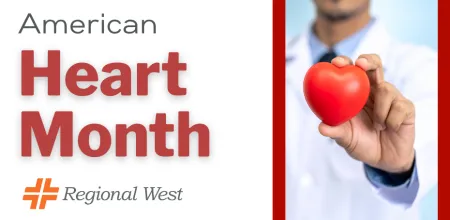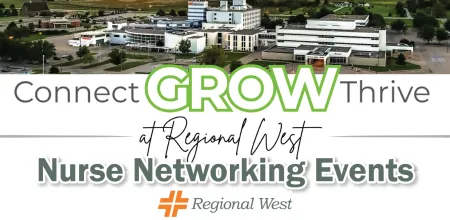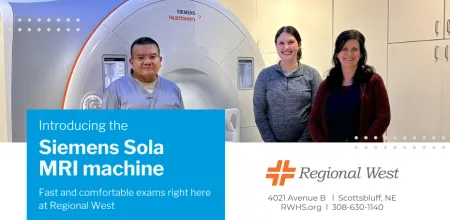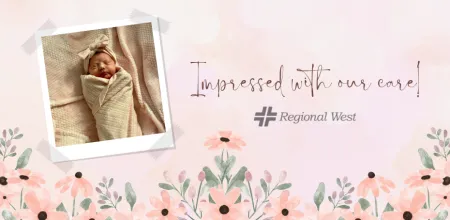Regional West Named Chest Wall Injury Society (CWIS) Collaborative Member

SCOTTSBLUFF, Neb., ― Regional West was recently named a Chest Wall Injury Society (CWIS) collaborative member.
The two-year membership in the national society is in recognition of outstanding partnership to advance the care of patients with chest wall injuries through rigorous research, promotion of patient access, navigation, and advocacy, coordination of education and networking, and practice of high quality, evidence based, cost effective care.
CWIS Board of Directors Chairman Thomas White, MD, FACS, CNSC, made the announcement during the Western Nebraska Trauma Symposium Friday, March 24 at Regional West.
Chest wall injuries include damage to the bones (including the ribs and sternum), skin, fat, and muscles protecting the organs of your chest – between the neck and abdomen. They can include bruising or abrasions, broken bones such as a rib fracture, and flail chest where multiple ribs next to each other are broken and that segment of the chest wall moves separately to the rest.
“Regional West demonstrated that they understand how important chest wall injury is,” said Dr. White, a former surgeon at Regional West who is currently a trauma surgeon at Intermountain Medical Center in Salt Lake City, Utah. “They have the proper processes in place. They contribute to research and education.”
Zachary Bauman, DO, MHA, FACOS, FACS, trauma medical director and chest wall injury medical director at the University of Nebraska Medical Center in Omaha, spoke at the conference about rib fractures and rib plating, a relatively new technology being performed at Regional West as well as facilities in Omaha and Lincoln that enables surgeons to repair a rib fracture. In the past chest wall injury treatment has generally consisted of physicians trying to manage pain while the injury heals, but Dr. Bauman said that has changed through new technology.
Rib fixation or rib plating is becoming more and more commonplace in chest wall injury management. Rib fixation is a surgical procedure in which the bones of the rib are essentially put back in place to heal using metal plates screwed to the bones by the surgeon. This procedure allows for the injury to heal more quickly and efficiently with less pain. Rib fixation helps the injury heal properly while reducing the use of opioid pain medication, thus reducing the risk of addiction to the opioids.
“Nebraska is on the cutting edge of these new procedures and chest wall injury management and protocols,” Dr. Bauman said. “It’s really taken off in this past decade in terms of research and its benefit to patients across the country, and worldwide.
“There are facilities performing chest wall injury management on a regular basis and have really tried to protocolize and streamline things to prevent things like opioid addiction and chronic pain,” said Dr. Bauman, who is also the Nebraska state trauma director. “I would love to see a statewide chest wall injury management process in place where everyone in the state knows where these patients can be treated and helped.”
Regional West Trauma Medical Director Rommie Hughes, MD, FACS, RPVI, said it’s important that Regional West, as the state’s only Level II Trauma Center west of Kearney, stays on the leading edge of procedures for its patients.
“Dr. White and Dr. Bauman practice at Level I Trauma Centers, so they’re seeing the sickest of sick patients,” Dr. Hughes said. “They exclusively perform trauma surgery, so they’re able to give us some good insight and share their knowledge base.”
Regional West Health Services in Scottsbluff, Neb., is the parent company of Regional West Medical Center, a 188-bed regional referral center and the only Level II Trauma Center in Nebraska west of Kearney. As the region’s only tertiary referral medical center, Regional West offers care that spans more than 32 medical specialties provided by over 28 physician clinics. With nearly 300 in-network providers and approximately 2,000 employees, Regional West provides comprehensive and innovative healthcare services for the people of western Nebraska and the neighboring states of Colorado, South Dakota, and Wyoming.

